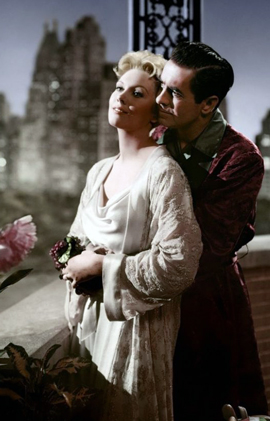
 |
|
|
|
The vogue for musical biographies in the classic Hollywood mold was beginning to wane when Anthony Mann and James Stewart scored a major hit The Glenn Miller Story, a romanticized telling of the life of the famous, ill-fated band leader. Two years later Columbia came up with this look at another big name, a pianist-bandleader who specialized in a lush Manhattan sound as opposed to the jazz of his time. Director George Sidney's The Eddy Duchin Story (1956) is a sincere and leisurely tale that doesn't try to be much more than two hours of melody and emotion. It also features fine performances from Tyrone Power, Kim Novak, and the City of New York. New York, 1931: running away from a career as a pharmacist, young pianist Eddy Duchin (Tyrone Power) gets a job at the Central Park Casino playing intermissions for big bandleader Leo Reisman (Larry Keating). His introduction to the tuxedo set comes thanks to the intervention of beautiful socialite Marjorie Oelrichs (Kim Novak). As Eddy's popularity soars he overcomes his ambitions to join high society, only to fall in love with Marjorie. Duchin and his piano-led orchestra eventually become a top attraction of the Depression years. After his happy wedding to Marjorie, Eddy is certain that an angel must be looking after him. And then tragedy steps in to change everything. 
Hollywood musical biographies date quickly. Many are little more than mawkish bits of plotting and overeager actors, sandwiched between overblown production numbers. Real biographical facts are not a requirement, as the subject's personality is usually enlarged to become as big and romantic as his music. There's nothing very cinematic about watching a composer writing a song, which is why Words and Music (Rodgers & Hart) becomes a vaudeville show and Yankee Doodle Dandy (George M.Cohan) an ode to patriotic idealism. In these pictures the heroes are all touched by a magical 'genius' that opens doors and creates riches out of pure harmony. In movies like The Al Jolson Story, the message is that the 'great talent' has attained a new level of existence, like a demigod -- and the great music is there to convince us of it. Eddy Duchin is the perfect material for a musical biography, a wildly popular New York pianist of the 1930s. He dazzled the hi-toned nightclub crowd with his keyboard style, which included stunts like reversing hands in the middle of a piece. Duchin's early passing in 1951 provides the movie with a bittersweet ending, but central to his story is a personal tragedy that torpedoed what had previously been a charmed life. Much of the second half of The Eddy Duchin Story shows a bitter man only slowly finding his way back to his earlier values. For positive uplift, there's Eddy's son Peter, who in real live idolized his father and became a popular pianist in his own right. Duchin's story needs no exaggeration to generate the requisite pride and pathos of the genre, and director George Sidney lends it a sense of balance and elegance. Tyrone Power is far too old to play the young Duchin but his makeup here fares much better than that in John Ford's The Long Gray Line just a year earlier. To untrained eyes Power's keyboard work is quite convincing, as if he had studied Duchin's style before faking the fancy moves of the first pianist superstar. But the biggest appeal of The Eddy Duchin Story is probably Kim Novak, who at the time was in first bloom as one of the biggest stars in Hollywood. She's perfectly cast here as a classy heiress who swims in only the most exclusive Park Avenue circles. The manners and gilt of these surroundings are far more natural to her than the rowdy campus life in Five Against the House, and Novak never seemed enough of a schemer to be the femme fatale of Pushover. In The Eddy Duchin Story she's sensual and forbiddingly ladylike at the same time, qualities that surely excited Alfred Hitchcock when he needed a replacement for Vera Miles in Vertigo. No star wears clothing as well as did Novak; she hasn't a single un-photogenic angle. |
|||||||||||||||||||
Review Staff | About DVD Talk | Newsletter Subscribe | Join DVD Talk Forum
Copyright © MH Sub I, LLC dba Internet Brands. | Privacy Policy
Subscribe to DVDTalk's Newsletters
|